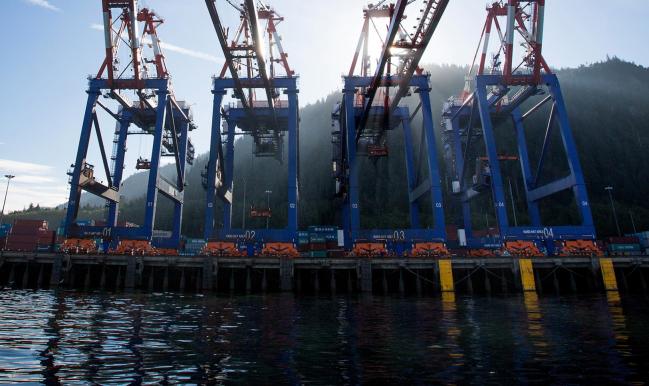(Bloomberg) -- Making America great again isn’t proving so great for other parts of the world.
With the rise in the dollar and interest rates already squeezing emerging economies just as President Donald Trump’s trade war threatens China, the U.S. is set to be the only Group of Seven nation to see economic growth accelerate this year as Trump’s tax cuts kick in.
The end of the short-lived euphoria of a synchronized global upswing is already evident in financial markets. NatWest Markets notes its basket of so-called growth assets such as the Australian dollar and copper is down about 4.5 percent this year compared with the almost 7 percent gain of the Standard & Poor’s 500 Index.
The gap in performance “certainly captures the imbalanced nature of growth this year,” said Jim McCormick (NYSE:MKC), head of cross-asset strategy at NatWest.
The global backdrop will frame discussions when the Federal Reserve holds its annual policy symposium this week in Jackson Hole, Wyoming, at which Chairman Jerome Powell will speak. The Fed’s two interest-rate hikes of 2018 have helped lift the dollar almost 6 percent on a trade-weighted basis this year, making it costlier for international borrowers to repay loans.
Minutes of the Fed’s most recent policy meeting, due later on Wednesday, may provide clues on the outlook for rates in 2019. For now, Mark Nash, head of fixed income at Old Mutual Global Investors, bets the domestic economy will keep the central bank raising rates although it could end up creating headwinds for itself.
“Once that pain in emerging markets gets particularly acute, that naturally will spread back to the U.S. and change things in terms of how the Fed needs to manage domestic monetary policy,” he said on Bloomberg Television. “For now, you can’t fault what Powell is doing, but the implications of it might come back to haunt him.”
Evidence of a moderation outside of the U.S. is already visible. Economists at JPMorgan Chase & Co (NYSE:JPM). say although overall global growth is higher than its long-term trend thanks to the U.S., the share of countries performing above potential has fallen to 60 percent from about 80 percent in 2017.
China’s momentum has stalled as policy makers curb risky lending and the trade dispute with the U.S. begins to bite, prompting policy makers to shift gears to signal a willingness to support activity. Economists also see a slowdown in Japan.
Across much of Europe, surveys and confidence indicators have turned lower this year in part because of export concerns. German factory orders -- a gauge of future output in the euro area’s largest economy -- posted their first annual decline in almost two years in June.
Italy is squaring up for a clash with investors over its fiscal plans, with implications for debt costs, while there’s no end to the uncertainty surrounding Brexit in the U.K.
Then there’s emerging markets. Turkey’s lira has plunged amid a political crisis, Venezuela has executed one of the biggest devaluations in history and Argentina is jacking up rates to protect its currency. While none have the heft to drag the global economy into a recession, the resulting fallout on markets could be a blow to confidence if the pain spreads to emerging market powerhouses such as Brazil.
Tom Orlik, chief economist at Bloomberg Economics, doesn’t expect emerging markets take down the world. He observes that excluding China, emerging and developing economies accounted for 24.6 percent of global output last year, down from a peak of 26.7 percent in 2013.
Cross border trade is though deteriorating, with growth rates in emerging economies slowing by a fifth in August, according to a gauge by logistics giant Kuehne + Nagel Group. They calculate that commerce in Brazil, South Korea, Taiwan, and India is shrinking by more than 5 percent year-on-year.
Asia’s slowing bears watching. Excluding Japan, the region’s contribution to global growth was 40 percent in 2017 compared with 23 percent in 2007, reflecting its larger economic size and deepening integration with the world, according to Robert Subbaraman, Singapore-based head of emerging markets economics at Nomura Holding.
“It is no longer a question of ‘if’ but more a matter of ‘how much’ Asian growth will slow in the second half,” Subbaraman said.
(Updates with Federal Reserve minutes in sixth paragraph.)
